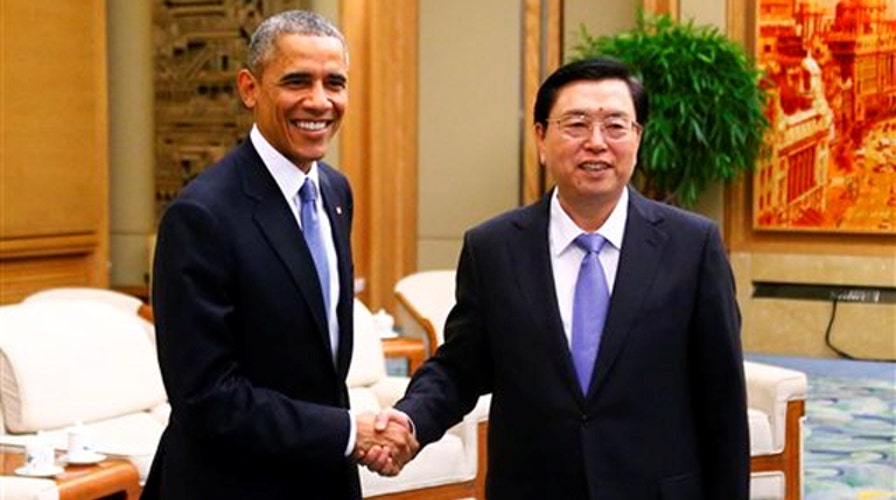Critics slam US-China climate change deal
Peter Brookes: Deal encourages China to dominate Asia
President Barack Obama announced Wednesday that the U.S. has set a new goal to reduce emissions of greenhouse gases by between 26 percent and 28 percent over the next 11 years as part of a climate change agreement with China.
The new target is a drastic increase from earlier in Obama's presidency, when he pledged to cut emissions by 17 percent by 2020. By contrast, Obama's counterpart, Xi Jinping, did not pledge any reductions by a specific date, but rather set a target for China's emissions to peak by 2030, or earlier if possible. Xi also pledged to increase the share of energy that China will derive from sources other than fossil fuels. China's emissions have grown in recent years due to the building of new coal plants.
"This is a major milestone in the U.S.-China relationship," Obama told a news conference in Beijing, with Xi at his side. "It shows what's possible when we work together on an urgent global challenge."
The Associated Press reported that the deal was the result of months of secret discussions between U.S. and Chinese officials.
It was unclear how feasible it would be for either country to meet their goals, and Obama's pledge was sure to confront tough opposition from ascendant Republicans in Congress.
"This unrealistic plan, that the president would dump on his successor, would ensure higher utility rates and far fewer jobs," said incoming Senate Majority Leader Mitch McConnell, R-Ky, in a statement.
But environmental advocates in the U.S. heralded the joint announcements as a game-changer that would undermine any legislative opposition.
"Now there is no longer an excuse for Congress to block action," said Sen. Barbara Boxer, D-Calif., who chairs the Senate's environmental panel.
Al Gore, the former vice president and a leading advocate for limiting climate change, called the announcement "a major step forward in the global effort to solve the climate crisis." He said more will be required -- "including a global agreement from all nations -- but these actions demonstrate a serious commitment by the top two global polluters."
Obama's target, expected to serve as the U.S. contribution to a worldwide treaty to be finalized next year in Paris, came months before it had been expected. The U.S. has sought to show aggressive action on climate change in order to spur other nations to offer ambitious contributions, too.
China accounts for around 30 percent of global emissions, but has only gotten serious about the issue in recent years as the large-scale impact on health and quality of life in China has come into focus, exacerbated by smothering smog in Beijing's skies.
The Associated Press contributed to this report.





